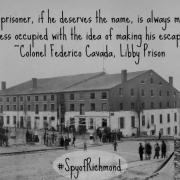On this Day in 1864: Libby Prison Breakout!
On February 9, 1864, 109 Union prisoners escaped from the notorious Libby Prison in Richmond, Virginia. The story of this prison break, including the months of secret, dangerous preparations, is so intense and exciting I'm surprised Hollywood hasn't turned it into a movie yet. As for me, as soon as I discovered this historical drama, I knew it would have a prominent place in my novel, Spy of Richmond. And it does.
I don't want to spoil the book for you, but I can at least tell you that the situation at Libby, aka the Bastille of the South, had grown desperate by the time of the breakout. The prisoners were "starving by inches," as Lt. Cyrus P. Heffley wrote. The prisoner exchange program had been suspended, and plans were already underway to move the prisoners to Andersonville---where any hope of escape to the North would have dissolved completely. If any were to escape, they should do it now. But hope and despair battled fiercely as multiple escape attempts failed.
Libby held about 1200 Union officers at the time of the escape. Joseph Wheelan, author of Libby Prison Breakout, also learned that a number of Union colored soldiers were kept in the cellar. This is puzzling, of course, since Jefferson Davis had said black soldiers were to be treated as runaway slaves--either shot, or sold further South into slavery. The white and black prisoners had extremely different experiences in the same prison. In Spy of Richmond, you'll get to see, and maybe feel, what those differences are through the eyes of my characters.
The breakout was engineered by two masterminds I have come to know and love: Colonel Thomas E. Rose, a schoolteacher from Pennsylvania, and Major A.G. Hamilton, a homebuilder from Kentucky. Once free of the prison property, the escapees would have had little chance of survival had it not been for the help of the Union loyalists (black, white, slave, free, men and women) in Richmond, including Elizabeth Van Lew, head of the underground spy network that fed intelligence to Union General Benjamin Butler. Rose, Hamilton, Van Lew, and Butler all appear in Spy of Richmond as they interact with my fictional characters.
For everything you want to know about the breakout and its context, I highly recommend Wheelan's Libby Prison Breakout: The Daring Escape from the Notorious Civil War Prison. Mr. Wheelan was kind enough to answer my emails when I was in the throes of my own research, and I'm honored that he even read and endorsed Spy of Richmond.

